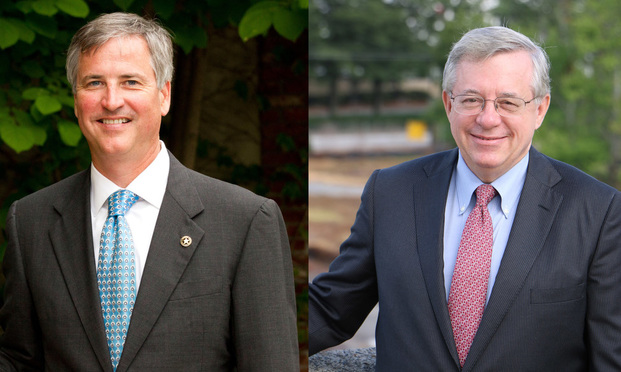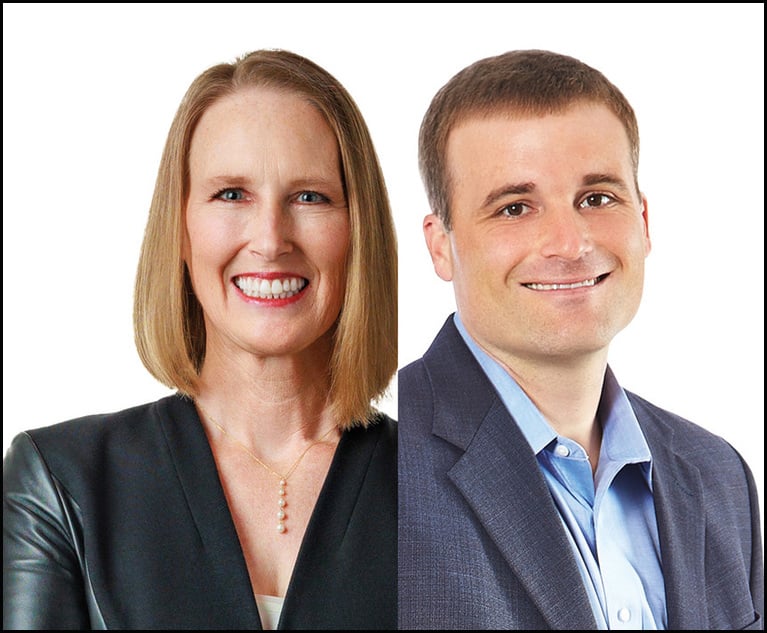Two Kens, One Court of Appeals Seat, Seven Questions and Answers
Candidates Ken Hodges and Ken Shigley answer questions about their appellate experience and their approaches to stare decisis, diversity, technology and more.
May 11, 2018 at 11:56 AM
13 minute read

The Daily Report, after consulting with some appellate law experts, posed the following questions to the two lawyers seeking an open seat on the Georgia Court of Appeals, Ken Hodges and Ken Shigley. Their answers are below. Early voting is available throughout the state, and Election Day is Tuesday, May 22.
1. Describe two of the most significant appeals you have handled as lead counsel.
HODGES: World Harvest Church, Inc. v. GuideOne Mutual Insurance Company, 287 Ga. 149 (2010), highlights my experience handling unsettled legal questions. There, I convinced the Georgia Supreme Court to overrule one of its decisions from just five years earlier.
In that case, I represented a church that sued an insurance company for breaching an insurance contract by failing to defend a lawsuit. The underlying case was filed in federal court, and the U.S. Court of Appeals for the Eleventh Circuit certified three issues to the Georgia Supreme Court.
The Georgia Supreme Court unanimously agreed with us. It began the opinion setting out that the insurer had not effectively reserved its rights. And it further found that the insurer was estopped from asserting noncoverage as a defense—whether or not the church could show prejudice. And for those reasons, it didn't need to address the third issuer in ruling for my client.
Zachary v. Hilton, No. S16M1515 (Ga. May 17, 2016), demonstrates that I'm both effective and efficient in handling appellate matters. In that case, a would-be challenger in a rural sheriff's election had been convicted of several misdemeanors for writing bad checks. Under Georgia law, candidates for sheriff must not have been convicted of crimes “involving moral turpitude.” But the election supervisor—one of the challenger's supporters—ignored the law.
We appealed to the superior court, which reversed the election supervisor. Within weeks, we were fighting an emergency petition for certiorari before the Georgia Supreme Court. The court agreed with us—unanimously—denying all of the challenger's motions and denying certiorari. Our client won the election in a landslide.
SHIGLEY: I have chosen two cases not so much for broad public significance as for the lessons they illustrate in the handling of cases on appeal.
First is a case that illustrates the importance of oral argument in focusing issues for an appellate panel. In Giddens v. Equitable Life Assur. Soc. of U.S., 445 F.3d 1286 (2006), I won summary judgment in district court on briefs, but a lively give-and-take in oral argument was crucial in focusing busy appellate judges on key issues in the case. One judge posed a pointed question to opposing counsel at the end of his time. Another judge chortled at my first point on rebuttal. The case involved the definition of “occupation” in a disability insurance policy covering a dentist who continued what had been a side business in real estate development after he was no longer able to continue in dentistry. The court held that, even though he was no longer practicing dentistry, his part-time real estate activity was an occupation sufficient to support his disability insurance claim.
Second is a “deadbeat dad” case that illustrates the risk of sacrificing common sense fairness to theoretical purity. In Rainey v. Chever, 527 U.S. 1044, 119 S.Ct. 2411, 144 L.Ed.2d 808 (1999)(cert. denied), O.C.G.A. § 53-2-4(b)(2) provided that the father of a child born out of wedlock could not inherit from the child if he failed to support the child or openly treat the child as his own. I represented a mother who raised to young adulthood a child born out of wedlock when she was a teenager. The biological father had absolutely no role in the child's life beyond $1,800 in child support recovery garnishments spread over 18 years. The Supreme Court of Georgia held that the statute violated equal protection because it excluded inheritances by fathers who fail to support or treat children as their own, while saying nothing about mothers who are guilty of such conduct. We applied for certiorari to the U.S. Supreme Court. Based on prior Supreme Court decisions recognizing the significance of a woman's unique role in bearing children, I argued that the statute did not make an impermissible gender classification but rather made a permissible classification of two different categories of men: fathers who supported their children born out of wedlock and fathers who never shouldered any significant responsibility with respect to the supervision, education, protection or care of the child.
While we fell short of the four votes required for granting of certiorari in the Supreme Court, three justices (Thomas, Rehnquist and Scalia) vehemently dissented from the denial of cert, recognizing the significant constitutional and public policy issues at stake. The case apparently struck a nerve. Thirteen years later, when I met Justice Thomas during my term as state bar president, he remembered without prompting the facts and issues in the case and discussing at conference later.
2. Describe a situation where you had to support a legal position that conflicted with your personal beliefs? How did you handle it?
HODGES: Fortunately, that has never happened in my professional career. My personal beliefs are just that—personal. The judge's job is to apply the law that the Legislature enacts. Personal beliefs are irrelevant to any issue before the court. Of course, the Legislature may enact a bad law, but that's for the Legislature to fix, not the courts.
SHIGLEY: A former state labor commissioner went to prison on federal corruption charges, and the attorney general of Georgia took actions that created a conflict with his defense of a civil case against the former commissioner. The Department of Administrative Services referred to my firm the defense, at the U.S. Supreme Court stage, of the former commissioner in an employee's § 1983 suit alleging retaliatory discharge, and it was assigned to me as an associate. Reviewing the record in context, I believed the employee, an administrative law judge in the Department of Labor, was truly demoted in retaliation for the employee's exercise of constitutionally protected speech. However, as an associate in a law firm, I did my assigned job of defending the case on appeal through denial of the employee's petition for certiorari. Hopkins v. Caldwell, 471 U.S. 1117, 105 S.Ct. 2361 (Mem), 86 L.Ed.2d 261(1984)(cert. denied).
3. Do you believe women and/or people of color are underrepresented in Georgia's courts? If so, how would you, as a judge, work to change the situation?
HODGES: Of course they are. Fortunately that is changing, albeit slowly. As district attorney, I hired many woman and minorities. My chief assistant the entire time was African-American. And when I decided to return to private practice, I ran his campaign to succeed me, and he became the first African-American district attorney in Dougherty County.
As president-elect of the state bar, diversity is an important consideration in making appointments. And I plan to continue increasing diversity within the bar, and as a judge I will have the same approach.
I am proud to have received in 2013 the Commitment to Equality Award from the state bar Committee to Promote Inclusion in the Profession and will continue to advance this important cause. Even though Canon 7 of the Judicial Code of Conduct prohibits some political activities, I will appropriately encourage minority candidates to seek judicial office, by appointment or election, when possible.
SHIGLEY: Historical inequities persist. As a Court of Appeals judge, I would start with self-examination to ensure that I do not retain unconscious bias in my own attitudes. I would have diversity in my own staff, encourage law firms with cases before the court to facilitate participation in oral argument by female and minority lawyers in their firms, if feasible, and find an appropriate context in which to make myself available to mentor lawyers who aspire to become judges.
4. What U.S. Supreme Court justice who served in the past 20 years would you like to emulate and why?
HODGES: I'd like to emulate Chief Justice John Roberts. He strives to build consensus in a time of profound division. Consensus in judicial opinions often, though not always, lends much-needed clarity to the law. I also appreciate that he sometimes decides controversial issues on narrow grounds. This reflects a respect for federalism and the separation of powers.
I also admire Associate Justices Antonin Scalia and Sandra Day O'Connor. Justice Scalia's clarity and his approach to constitutional interpretation profoundly affected how judges across the country think and talk about the law. And Justice O'Connor, like Chief Justice Roberts, focused on the narrow issues at hand in crafting her opinions.
My approach will be a blend of these three justices. I will be a consensus builder, which is critical in working on an appellate court, and I will endeavor to write clearly. Substantively, I intended to follow the rule of law and to leave the legislating to the Legislature.
SHIGLEY: There is no one justice with whom I would always agree. In terms of articulating the textualist methodology for seeking original intent of constitutional and statutory authorities according to the public meaning of the language at the time of enactment, Justice Scalia provided a useful methodology for application of the traditional canons of statutory interpretation. In terms of temperament, balance and relatively apolitical approach and her promotion of civic education after retirement from the court, Justice Sandra Day O'Connor is admirable.
5. What is your approach to stare decisis? Under what circumstances would you vote to overturn a precedent of the Court of Appeals?
HODGES: Stare decisis is the backbone of common law. It fosters predictability. Without it, people and businesses are left in the dark. But stare decisis has its limits. Take Plessy v. Ferguson—the decision that allowed racial segregation—for example. In cases like Plessy, it becomes obvious that the rationale underlying earlier decisions was incorrect. In those cases, overruling a precedent is proper. In short, it is a balance between the predictability that stare decisis fosters and doing justice: The two aren't always the same. But precedent should not be overturned lightly. After all, uncertainty is bad for the people, and it's bad for business.
SHIGLEY: Clarity, consistency and stability in the law are vitally important. However, it is an old joke that, if you haven't found a Georgia Court of Appeals case to support your position, whatever it may be, perhaps you haven't looked hard enough. Insofar as feasible, when such conflicts in authority arise, I would seek to do on the court as we taught Boy Scouts to do when breaking camp, “Leave the campground a little cleaner than you found it.” I would strive for clarity, consistency and stability in conformity with constitutional and statutory authorities.
Where precedents do not comport with statutes, the court is not bound to perpetuate error but may seek to harmonize conflicting precedents. In doing so, the court must balance the importance of having an issue settled finally against the importance of having it decided correctly. Factors to consider include (1) the age of the precedent, (2) the reliance interests at stake, (3) the workability of the decision, and (4) the soundness of its reasoning.
6. What can be done to improve the preparation of the trial court record for review by the Court of Appeals?
HODGES: To keep up with increasingly sophisticated multimedia trial presentations, electronic evidence must be included in the record. Electronic filing is great. I intend to continue to improve the efiling system and expand access to digital information in the record. We need to implement a statewide system that is affordable and easy to use.
SHIGLEY: Implementation of technology, including uniform protocols for promptly assembling the record in searchable PDF format, would help. This may include counsel assisting the clerk in making sure the record is complete and in appropriate order for transmission to the Court of Appeals. Online video training of trial court staff for this function would help ensure uniformity.
7. What are your views regarding the use of nonprecedential opinions, such as unpublished opinions and judgment-only concurrences, in the Court of Appeals?
HODGES: There are pros and cons. The Court of Appeals, in most cases, is the only review that a party will have. Accordingly, unpublished opinions can give the parties, and the court below, understanding for the rationale of the decision without affecting stare decisis. It allows for the all-important review of the lower court and the due process for the parties without creating an opinion that might be inconsistent with previous holdings of the court. It is persuasive and can be used to advance your argument in later cases. The advantage to their use, of course, is efficiency with what is the busiest appellate court in the nation.
SHIGLEY: It is important for courts, counsel and litigants to have the guidance of well-reasoned precedents as the law develops in response to new circumstances. In view of the court's heavy caseload, unpublished opinions on routine questions in well-settled areas of law allow allocation of greater time and resources for more difficult issues. Overuse of this practice, however, can be an abdication of judges' responsibility to provide published precedents.
Concurrences in judgment only have been used historically to eliminate the precedential value of a case, perhaps most often when one of the panel members has reservations about a decision but decides to not to dissent. Before recent rule changes, a dissent automatically triggered a seven-judge panel. Thus, concurrences in the judgment only without a written statement could be used when a judge might otherwise dissent, but because of the timing of the case, caseload concerns and importance of the legal issue, it wasn't feasible to send it to a seven-judge panel.
Now that a 2-1 decision can be final, there may be more lively discussion when panel members are not in agreement on an outcome, they will seek to convince each other. And, if they can't, we will see some 2-1 decisions with written dissents. Thus, concurrences in judgment only should largely become a thing of the past and only be used when a judge fully agrees with the outcome but doesn't agree with all of the reasoning. Even when that's the case, I generally would favor a written statement explaining the reservation about the outcome over an unexplained concurrence in the judgment only. That would be a healthy thing in my opinion.
This content has been archived. It is available through our partners, LexisNexis® and Bloomberg Law.
To view this content, please continue to their sites.
Not a Lexis Subscriber?
Subscribe Now
Not a Bloomberg Law Subscriber?
Subscribe Now
NOT FOR REPRINT
© 2025 ALM Global, LLC, All Rights Reserved. Request academic re-use from www.copyright.com. All other uses, submit a request to [email protected]. For more information visit Asset & Logo Licensing.
You Might Like
View All
On The Move: Energy Infrastructure Pro Joins Moore & Van Allen, Adams & Reese Changes Atlanta Leadership
6 minute read
40% Contingency: A New Ruling Just Cost This Plaintiff Team $827K in Legal Fees
6 minute read

'David and Goliath' Dispute Between Software Developers Ends in $24M Settlement
Trending Stories
- 1'It's Not Going to Be Pretty': PayPal, Capital One Face Novel Class Actions Over 'Poaching' Commissions Owed Influencers
- 211th Circuit Rejects Trump's Emergency Request as DOJ Prepares to Release Special Counsel's Final Report
- 3Supreme Court Takes Up Challenge to ACA Task Force
- 4'Tragedy of Unspeakable Proportions:' Could Edison, DWP, Face Lawsuits Over LA Wildfires?
- 5Meta Pulls Plug on DEI Programs
Who Got The Work
Michael G. Bongiorno, Andrew Scott Dulberg and Elizabeth E. Driscoll from Wilmer Cutler Pickering Hale and Dorr have stepped in to represent Symbotic Inc., an A.I.-enabled technology platform that focuses on increasing supply chain efficiency, and other defendants in a pending shareholder derivative lawsuit. The case, filed Oct. 2 in Massachusetts District Court by the Brown Law Firm on behalf of Stephen Austen, accuses certain officers and directors of misleading investors in regard to Symbotic's potential for margin growth by failing to disclose that the company was not equipped to timely deploy its systems or manage expenses through project delays. The case, assigned to U.S. District Judge Nathaniel M. Gorton, is 1:24-cv-12522, Austen v. Cohen et al.
Who Got The Work
Edmund Polubinski and Marie Killmond of Davis Polk & Wardwell have entered appearances for data platform software development company MongoDB and other defendants in a pending shareholder derivative lawsuit. The action, filed Oct. 7 in New York Southern District Court by the Brown Law Firm, accuses the company's directors and/or officers of falsely expressing confidence in the company’s restructuring of its sales incentive plan and downplaying the severity of decreases in its upfront commitments. The case is 1:24-cv-07594, Roy v. Ittycheria et al.
Who Got The Work
Amy O. Bruchs and Kurt F. Ellison of Michael Best & Friedrich have entered appearances for Epic Systems Corp. in a pending employment discrimination lawsuit. The suit was filed Sept. 7 in Wisconsin Western District Court by Levine Eisberner LLC and Siri & Glimstad on behalf of a project manager who claims that he was wrongfully terminated after applying for a religious exemption to the defendant's COVID-19 vaccine mandate. The case, assigned to U.S. Magistrate Judge Anita Marie Boor, is 3:24-cv-00630, Secker, Nathan v. Epic Systems Corporation.
Who Got The Work
David X. Sullivan, Thomas J. Finn and Gregory A. Hall from McCarter & English have entered appearances for Sunrun Installation Services in a pending civil rights lawsuit. The complaint was filed Sept. 4 in Connecticut District Court by attorney Robert M. Berke on behalf of former employee George Edward Steins, who was arrested and charged with employing an unregistered home improvement salesperson. The complaint alleges that had Sunrun informed the Connecticut Department of Consumer Protection that the plaintiff's employment had ended in 2017 and that he no longer held Sunrun's home improvement contractor license, he would not have been hit with charges, which were dismissed in May 2024. The case, assigned to U.S. District Judge Jeffrey A. Meyer, is 3:24-cv-01423, Steins v. Sunrun, Inc. et al.
Who Got The Work
Greenberg Traurig shareholder Joshua L. Raskin has entered an appearance for boohoo.com UK Ltd. in a pending patent infringement lawsuit. The suit, filed Sept. 3 in Texas Eastern District Court by Rozier Hardt McDonough on behalf of Alto Dynamics, asserts five patents related to an online shopping platform. The case, assigned to U.S. District Judge Rodney Gilstrap, is 2:24-cv-00719, Alto Dynamics, LLC v. boohoo.com UK Limited.
Featured Firms
Law Offices of Gary Martin Hays & Associates, P.C.
(470) 294-1674
Law Offices of Mark E. Salomone
(857) 444-6468
Smith & Hassler
(713) 739-1250






